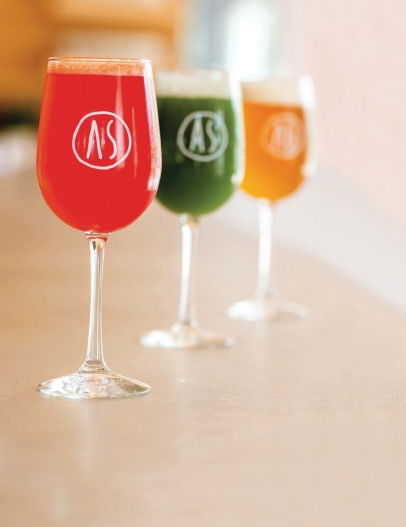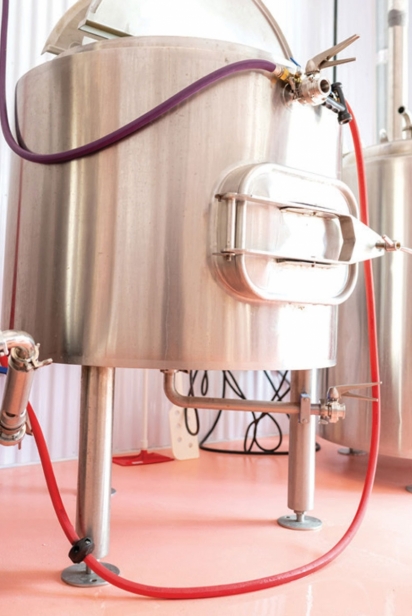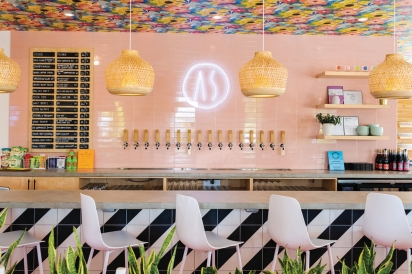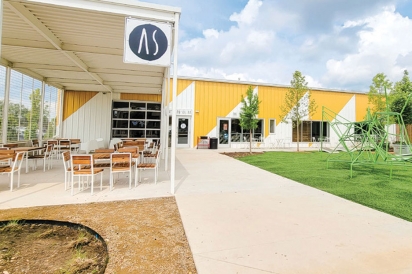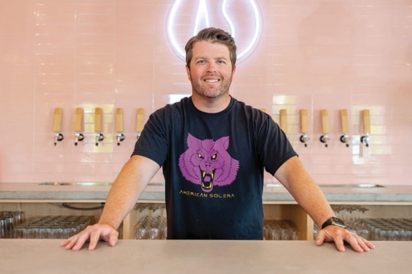American Solera - Keep Those Barrels Rolling
Smoke from the campfire rose in swirling ashy streaks toward the sky. Young Chase Healey’s dad was drinking from a stubby bottle reflecting emerald in the flames. Chase was fidgeting with the bottle cap, a hornet on the top and an inscrutable word puzzle underneath. Curious, he asked his dad for a sip. The request was ill-advised.
“I remember thinking it was bitter. Who would want to drink beer?” Chase laughs.
Three decades later, he’s boiled up a reputation as one of the most talented brewers in the country, and had a prominent hand in building Oklahoma’s craft beer scene. It’s a firecracker journey that has led him to American Solera. Founded in Tulsa during 2016, American Solera immediately won 2nd Best Brewery in the World from RateBeer, as well as Best in America that same year. This year, it landed a James Beard Semi-Finalist nomination for Outstanding Bar. Its combination of creative takes on old-world brewing methods and perfecting newer styles puts it in a unique place in a market that is either forever chasing trends or stuck in the stubbornness of tradition.
American Solera’s newest taproom is located in downtown Edmond’s Icehouse Project. Behind the plants, soft pastel colors, and low-lit interior designed by Chase’s wife and co-owner Erica Healey, head brewer Matt Denham and his team are brewing some of their selections, and enjoying them.
Chase’s journey to American Solera seems almost meteoric. At 38 years old, he’s spent half his life brewing, beginning with a homebrew kit Erica bought for him during college. It immediately became an all-consuming passion. “In college, homebrewing got to where we would take most of the food and shelves out of our fridge. We just had beer and deli meat,” Chase recollects.
When he heard about COOP Ale Works preparing to launch, he joined the team and helped brew its first batch of beer in January 2008. After a stint there, he left for the short-lived Redbud in 2010, where he scaled up some of his Belgian-style homebrews. It was a smaller affair, often having to create the art himself and enlisting family to help label bottles. “I was navigating a lot with a little experience,” Chase remembers.
In 2012, Chase and his brother, Colin, opened Prairie Artisan Ales and began with a focus on farmhouse ales. Their fortunes changed with four letters: B-O-M-B.
The beer, Prairie Bomb!, figuratively blew up to the point that it can now be found anywhere from Sapulpa, Oklahoma, to Seoul, South Korea. The larger Prairie got, however, the more Chase longed for projects that wouldn’t quite work on a large scale.
Enter American Solera.
The brewery’s namesake, the solera method, was created in Spain during the 18th century and is often associated with fortified wines like port or sherry. The method builds complexity and consistency through blending alcohol of varying ages.
“These kinds of beers are hard to scale. Amber Canyon Magik has been sitting in wine barrels for two to three years and is blended with younger beer to balance out the acidity and flavor,” Chase explains. “This is a difficult beer to make 24 pallets of.”
This esoteric system creates beers with intricate tasting notes best savored like a glass of good wine; its New England IPAs, the hottest trend of the last five years, are considered some of the best in the country.
Aside from Chase’s love of brewing and creating flavors, American Solera might not have as much of the broad appeal it has maintained had he not trusted his colleagues.
“Early on with Prairie and American Solera, I feel like I used to operate very ego-heavy, and everything was about me and my story and my ideas. I wanted to make beers that were real statement-y and good and they were exclusive and we were the best,” he admits. “Anymore, to see us execute well is the success I’m after now.”
Chase continues, “I’ve realized any success I’ve had or American Solera has had really has to do with everyone else involved. Sometimes, I’m like, ‘What do I even do here anymore?’ Erica, my wife, literally runs the brewery. I couldn’t even access the documents,’” Chase pauses while Erica laughs in the background. “Erica runs the nuts and bolts of our business, Katie manages the taprooms, Matt and his team produce the beer — and all I bring anymore is vision and some funny ideas.”
One of those not-so-funny ideas was getting into winemaking. Oklahoma wine has long been synonymous with syrupy sweet, stomachache-fuel dessert wine, neither elegant nor sophisticated. After collaborating with Field Recordings, a winery in Paso Robles, California, to create funky beer/wine hybrids, Chase got the itch to bring wine-maker Andrew Jones’ ethos of spontaneously fermented natural wines to the Sooner State.
“We’re doing all these projects with grapes. Can we make wine and make it cool, even though we’re working on it in the middle of the country?” Chase asks. “We’re working with local grapes where we can, but we’re also working with Field Recordings and Andrew is sending us grapes that are carbonically fermenting as they’re shipped across the country.”
Even with American Solera extending its range, the goal is to preserve the intimacy of its product and the experience of enjoying it in one of its taprooms, and to not get bigger than necessary.
“The benefit of being small and not overextending is you can ebb and flow with the industry. The last few years, with the pandemic and the recession, we’re able to hang on, ride it out, and see the light at the end of the tunnel,” Chase explains. “We’ve tried to be not so over-extended that it’s hard to operate. It helps me sleep better at night.”
When you’re lying in bed wondering which solera barrels to blend, that’s plenty to think about.
> American Solera, 129 W 2nd St., Edmond, (405) 920-6210, americansolera.com


